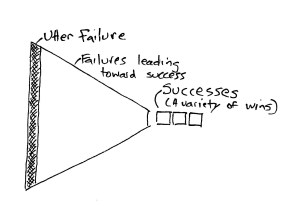You’ve seen the t-shirt, “Pain is the feeling of weakness leaving your body.” Maybe the pain of failure is the feeling of being relieved of our illusions. But, where’s the gain in this pain?
The next time I find myself brooding over my failures, I will ask myself:
- What failed exactly?
- What assumptions was I making about the nature of the elements, the mechanisms and the processes I was working with?
- Did I think I could control the outcomes based on that understanding?
- What might I learn from the death of any illusions built into my assumptions?
Under all these questions is a much bigger one: How much do we know about anything?
“All the stars, planets and galaxies that can be seen today make up just 4 percent of the universe. The other 96 percent is made of stuff astronomers can’t see, detect or even comprehend.”
–Clara Moskowitz, SPACE.com
Given the narrow scope that we can perceive, much less understand, we need to allow ourselves a lot of room for experimentation. What experiments could we do that would relieve ourselves of more illusions more quickly?
With more data maybe we could gain a more nuanced and complete understanding of what is under our control and what is not.
This makes me wonder, when is failure an utter failure?
- Where is the line that separates success from failure?
- Who put it there?
- Could I move it, based on analysis of a failed experiment, to support my long-term success?
- How could I alchemize a failure into a set of potentially golden learnings?
This is at the core of the agile leadership idea of fast failing.
The problem is, it might be fun failing quickly with a great team building an app or writing a marketing campaign. It is far less fun when the failure looks like relationship stress, financial hardship, divorce, or a failed business.
Maybe we should fearlessly fail, more often, in small, conscious ways. We could look at failure as simply the collection of data points around unexpected outcomes.
Of course, we should do all we can to minimize the risks on significant endeavors, but, in the end, isn’t this all an experiment we’re conducting in the 4% of the universe we can see and pretend to comprehend?
“Success is stumbling from failure to failure with no loss of enthusiasm.”
–Winston Churchill



